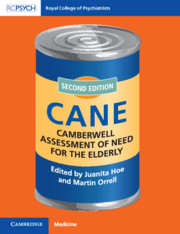Book contents
- Camberwell Assessment of Need for the Elderly
- Camberwell Assessment of Need for the Elderly (CANE)
- Copyright page
- Contents
- Figures
- Tables
- Contributors
- Acknowledgements
- Chapter 1 An Introduction to Needs Assessment and Use of the Camberwell Assessment of Need for the Elderly
- Chapter 2 Self-Reported Needs of People with Dementia Living at Home
- Chapter 3 Needs of Older Primary Care Patients
- Chapter 4 Unmet Needs of Older Persons with and Without Depression in Residential Homes
- Chapter 5 Needs of Older People Living Alone
- Chapter 6 Needs Assessment of People with Dementia and Impact of Caregiver Burden
- Chapter 7 Crisis and Assessment of Need in Dementia
- Chapter 8 Needs of People with Young-Onset Dementia
- Chapter 9 Needs of Older People in Long-Term Care Settings
- Chapter 10 Needs and Healthcare Costs in Old Age
- Chapter 11 The Future of Needs Assessment Research
- Instructions for the CANE
- Index
- References
Chapter 7 - Crisis and Assessment of Need in Dementia
Development of a Home Treatment Package
Published online by Cambridge University Press: 10 June 2021
- Camberwell Assessment of Need for the Elderly
- Camberwell Assessment of Need for the Elderly (CANE)
- Copyright page
- Contents
- Figures
- Tables
- Contributors
- Acknowledgements
- Chapter 1 An Introduction to Needs Assessment and Use of the Camberwell Assessment of Need for the Elderly
- Chapter 2 Self-Reported Needs of People with Dementia Living at Home
- Chapter 3 Needs of Older Primary Care Patients
- Chapter 4 Unmet Needs of Older Persons with and Without Depression in Residential Homes
- Chapter 5 Needs of Older People Living Alone
- Chapter 6 Needs Assessment of People with Dementia and Impact of Caregiver Burden
- Chapter 7 Crisis and Assessment of Need in Dementia
- Chapter 8 Needs of People with Young-Onset Dementia
- Chapter 9 Needs of Older People in Long-Term Care Settings
- Chapter 10 Needs and Healthcare Costs in Old Age
- Chapter 11 The Future of Needs Assessment Research
- Instructions for the CANE
- Index
- References
Summary
The population is ageing, and dementia is the greatest global challenge for health and social care in the twenty-first century.1 A recent review estimated that the financial cost of dementia overall to the United Kingdom is £34.7 billion, and this is set to rise sharply over the next two decades to £94.1 billion in 2040.2 In the United Kingdom, there are currently around 850,000 people living with dementia, and this is expected to almost triple by 2050.3 While approximately two-thirds of these people with dementia live in the community,4 one-third are living alone in their own homes5 and are supported mainly by their families.6,7 Dementia symptoms can occur alongside other mental health conditions, including depression and anxiety,8 together with an increased risk of physical health co-morbidities.1 The progressive nature of dementia is often coupled with other health and social needs, and management is complex.9 Given the multifaceted nature of dementia, crises can often occur and lead to hospital admissions and care home placements.10,11 Consequently, people with dementia account for 42% of people over the age of 70 who experienced unplanned admissions to hospital, rising to 48% of people aged over 80 years.12 However, people with dementia have poorer outcomes when admitted to hospital, including increased confusion, risk of infection, longer bed stays and lower quality of life.13
- Type
- Chapter
- Information
- Camberwell Assessment of Need for the ElderlyCANE, pp. 62 - 76Publisher: Cambridge University PressPrint publication year: 2021

